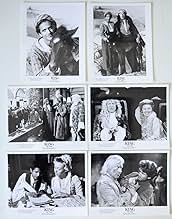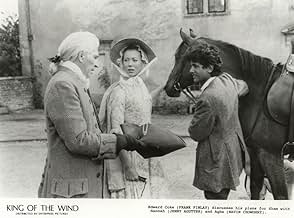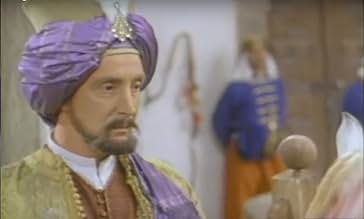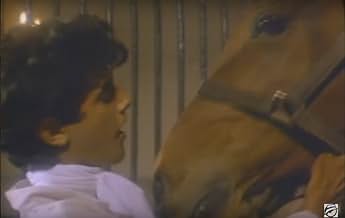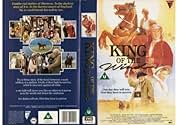In 1727, an Arab colt is born with the signs of the wheat ear and the white spot on his heel, evil and good and thus begins the life of Sham.In 1727, an Arab colt is born with the signs of the wheat ear and the white spot on his heel, evil and good and thus begins the life of Sham.In 1727, an Arab colt is born with the signs of the wheat ear and the white spot on his heel, evil and good and thus begins the life of Sham.
- Director
- Writers
- All cast & crew
- Production, box office & more at IMDbPro
Storyline
Did you know
- TriviaThis was Anthony Quayle's final film before his death on October 20, 1989 at the age of 76. He died seven months before the film was released in the UK.
Featured review
A stirring movie, spanning three continents and an ocean, about a disadvantaged boy moved to transcend his handicaps through intelligence and excellence, out of his love for an Arabian horse he'd cared for since the horse's birth.
Sound like fun? Probably would be. I'd like to see that movie. Instead, we saw "King of the Wind."
It's an interesting idea done in by the main human character and, unfortunately, that's hard to shrug off. We meet scoundrels and nobility, we traverse desert and sea and countryside... but unfortunately, everywhere we turn we're beset by this dim-witted, obnoxious, resourceless boy, Agba.
I don't know that the eighteenth century showed much charity towards the disabled; I would think that a mute, to survive, would have to be quick-witted, sharp and resourceful. Not this kid. Scene after scene features him standing about (sorry for the pun) dumbly. He hasn't even worked out a response for those who ask him his name — EVER! — invariably waiting stupidly for someone else to explain that he's mute. Evidently even the thought of pointing at his mouth and shaking his head is beyond his grasp.
Again and again things unfairly go against Agba, and he's unable even to explain (though he can eventually write) that he's innocent, or even try to do anything about his situation other than go along with events in sullen helplessness. Agba depends on others to bail him out each time. The only thing about Agba is his dogged devotion to a horse who is, arguably, smarter than he — which is no great compliment to the equine.
The movie only gets a "4" because, having visited England, I enjoyed the costumes and locations and living nobility. It's a charitable score at that. I'd like to have seen a good movie about these events. Too bad this wasn't it.
Sound like fun? Probably would be. I'd like to see that movie. Instead, we saw "King of the Wind."
It's an interesting idea done in by the main human character and, unfortunately, that's hard to shrug off. We meet scoundrels and nobility, we traverse desert and sea and countryside... but unfortunately, everywhere we turn we're beset by this dim-witted, obnoxious, resourceless boy, Agba.
I don't know that the eighteenth century showed much charity towards the disabled; I would think that a mute, to survive, would have to be quick-witted, sharp and resourceful. Not this kid. Scene after scene features him standing about (sorry for the pun) dumbly. He hasn't even worked out a response for those who ask him his name — EVER! — invariably waiting stupidly for someone else to explain that he's mute. Evidently even the thought of pointing at his mouth and shaking his head is beyond his grasp.
Again and again things unfairly go against Agba, and he's unable even to explain (though he can eventually write) that he's innocent, or even try to do anything about his situation other than go along with events in sullen helplessness. Agba depends on others to bail him out each time. The only thing about Agba is his dogged devotion to a horse who is, arguably, smarter than he — which is no great compliment to the equine.
The movie only gets a "4" because, having visited England, I enjoyed the costumes and locations and living nobility. It's a charitable score at that. I'd like to have seen a good movie about these events. Too bad this wasn't it.
- How long is King of the Wind?Powered by Alexa
Details
Contribute to this page
Suggest an edit or add missing content



